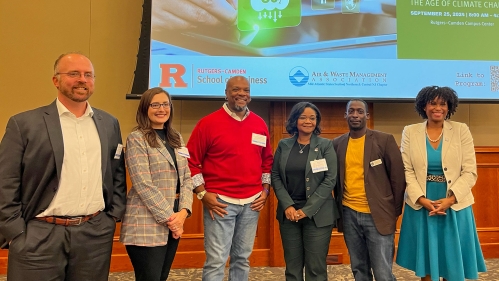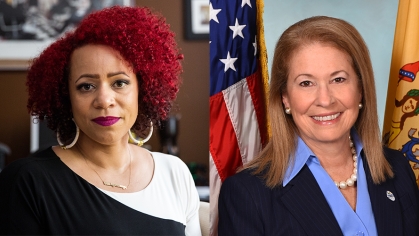Rutgers School of Business–Camden explores how partnerships between companies and communities can help prepare for a changing world
As temperatures across the globe continue to increase and "once-in-a-century storms" like Hurricane Helene become more commonplace, business leaders are among those faced with managing the challenges climate change presents. Those challenges were the focus of the second annual Rutgers School of Business–Camden Sustainability Conference.
“The magnitude of planning we will need to navigate as business leaders will only continue to grow,” said Monica Adya, dean of Rutgers School of Business–Camden.
The day-long event was co-sponsored by the Central and Northern New Jersey chapter of the Air & Waste Management Association and featured a keynote speech by Angela Ortiz, director of ESG and sustainability at PSEG, who discussed how proactive sustainability planning can align with business goals and why it is crucial to find that alignment.
The agenda included panels on climate change causes, water quality, waste management, and food insecurity.
While food insecurity may seem beyond the normal scope of sustainability topics, it is an important part of the overall equation. According to the United Nations, inefficient agricultural practices and food production systems account for a third of greenhouse gas emissions and 70 percent of the usage of the world’s fresh water.
The panel consisted of experts working on the front lines of food insecurity, including Loree D. Jones Brown, the CEO of Philabundance, and celebrity chef Aaron McCargo, Jr.
We think of America as the land of plenty, but the reality is far too much of our nation's food is going to waste.
Loree D. Jones Brown
CEO of Philabundance
Among Philabundance’s sustainability initiatives is a program that redistributes unspoiled food that would otherwise be thrown in the trash. In 2024, that program provided enough food to those in need to eliminate more than 38,000 tons of carbon emissions from the environment, or the equivalent of removing more than 8,300 cars from the road.
“People want to eat better but don’t have access to affordable produce or may not even have a supermarket in their neighborhood,” said McCargo, a Camden native. “We have to imagine different solutions to these problems, and they start at the local level.”
McCargo is part of a public-private partnership that plans to redevelop an abandoned Camden warehouse into a multi-floor food center. The center would include restaurants and retail spaces on the ground floor and indoor vertical farms on the upper levels, allowing fresh food to be grown and sold on site.
The conference's ultimate goal was to find unique solutions to the challenges presented by climate change and encourage partnerships between business and the community.
"Regions like Camden and South Jersey have a great opportunity to lead solutions to these issues, because we are home to a convergence of corporations, policymakers, and community organizers that are passionate about these issues," Adya said.



